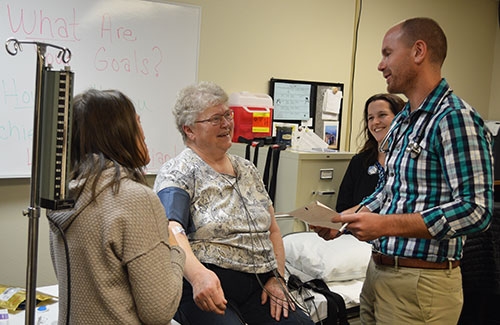You are here
Home ›February is National Heart Month; Nuclear cardiac stress testing popular at Veterans Memorial Hospital

Nuclear cardiac stress tests offered at VMH ... February is National Heart Month. The number-one cause of death in the United States is still heart disease. The Veterans Memorial Hospital Cardiac Rehab Unit has been offering nuclear cardiac stress tests to help detect heart disease for over a decade. Pictured in the Cardiac Rehabilitation Unit is patient Sheryll Karns of Lansing (center) as she prepares for her nuclear cardiac stress test, assisted by Dr. Steve Perkins (far right), Amy Rolfs, RN, Cardiac Rehab Nurse (left) and Katie Hackman, Nuclear Medicine Technologist with Shared Medical Technology (right). Local nuclear cardiac stress testing and cardiac rehabilitation allows Veterans Memorial Hospital to provide cardiac care with state-of-the-art technology. Submitted photo.
Veterans Memorial Hospital began nuclear cardiac stress testing within its Cardiac Rehab unit over 10 years ago, in 2008. The convenience of having these nuclear tests offered on a local level has been well received by many in the community since it began.
Nuclear Cardiac Stress Testing offers two different methods, both highly effective in detecting heart disease. These two forms of nuclear stress testing are called the Exercise Nuclear Stress Test and Lexiscan Nuclear Imaging. Both methods can increase the likelihood of finding heart disease by 20% when compared to traditional treadmill stress tests.
“The number-one cause of death in the United States is still heart disease. It’s not cancer or arthritis or the numerous other diseases that get a lot of attention, but it is the heart that we need to protect,” states Dr. Steve Perkins of the Waukon Mayo Clinic and Veterans Memorial Hospital. “With stress testing, we can detect heart disease before a heart attack occurs and we can save lives.”
While the traditional treadmill stress testing is still very effective, the nuclear cardiac testing has many advantages. This test involves taking two sets of images of the heart - one at rest and one after the heart is stressed either by exercise or medication. These images can show areas of low blood flow through the heart and damaged heart muscle. This information can be used to assess coronary artery disease, the size and shape of the heart and to guide treatment of heart disorders. The additional information obtained from a nuclear stress test is beneficial for patients with known coronary artery disease and those with vague or non-classic cardiac symptoms.
The process of having either the Exercise Nuclear Stress Test or the Lexiscan Nuclear Imaging stress test takes approximately four hours total. The patient receiving the Exercise Nuclear Stress Test does still need to exercise on the treadmill while being monitored by the physician.
The Lexiscan, or chemical stress test, is a method that can be used on those unable to exercise due to arthritis of the knees, hips, or due to poor exercise tolerance. These tests do have their limitations and some patients with severe COPD or Asthma should not undergo the chemical stress testing. The traditional treadmill stress tests take about 1-1/2 hours to perform. It will be up to the provider to determine which test is right for the patient. Prior to this service being added to Veterans Memorial Hospital, many patients would have to go to a larger facility and have a cardiologist perform these tests.
These new nuclear stress testing methods, as well as the traditional treadmill stress tests, are offered at Veterans Memorial Hospital on an outpatient basis. Any local medical provider can write an order for these tests to be scheduled at the hospital. Nuclear stress testing is available Thursdays by local providers. Traditional treadmill stress tests are available any day of the week.
“Talk to your healthcare provider if you are experiencing symptoms of heart disease and before you start an exercise regimen to determine if you need a stress test,” adds Dr. Perkins. “It has been a great privilege of mine to bring this method of stress testing to northeast Iowa and I have been very happy to partner with Veterans Memorial Hospital to provide this service to patients of the Mayo, Gundersen, Postville and other clinics in our area.”
For more information, call the Cardiac Rehabilitation Unit at Veterans Memorial Hospital at 563-568-3411.

